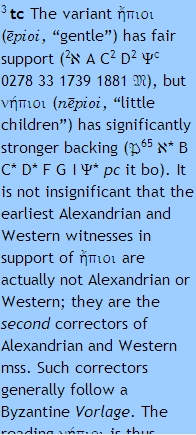


 |
 |
 |
Last Updated 9 January 2012
This web page aims to provide a quick reference so that readers can more easily discern the meaning of the valuable textual and translational information provided by the New Revised Standard Version of the Bible (NRSV). For a more complete explanation of the T&T notes, consult the section "To the Reader" in any edition of the NRSV Bible.
The New Revised Standard Version of the Bible (NRSV) comes with a standardized set of notes to indicate "divergent textual readings and alternate translations." These notes make accessible possible alternatives even to readers who know no Hebrew, Aramaic, or Greek. However, the reader must have some idea of the principles of textual criticism and translation issues in order for these notes to be meaningful.
In most NRSV Bibles these notes, here called "Text and Translation" or "T&T" notes, are found in the lower right corner of each page of biblical text. Do not confuse them with the "footnotes," which are usually all the way across the bottom of each page of biblical text, and which supply general information and comments on the text but do not usually speak directly about textual and translational issues. All NRSVs include these T&T notes, as well as the "To the Reader" section that explains their rationale and content.
This web page makes a simple distinction between:
(1) "textual" issues, in which the wording of the original
language* is in question; and
(2) "translational" issues, in which the original language
wording is undisputed but there are alternative ways of rendering it in English.
* the original language of the Old Testament is almost always Hebrew, with a little bit of Aramaic; the original language of the New Testament is Greek.
Both textual and translational issues come into play as a translation is developed; the NRSV is unusual among English translations, in making detail about these issues consistently available to the reader. If you want to know more about a specific textual or translational issue in a particular passage, consult a good scholarly commentary with verse-by-verse notes. For textual issues, the standard NT reference is A Textual Commentary On The Greek New Testament, A Companion Volume to the United Bible Societies' Greek New Testament, by Bruce M. Metzger, available in various editions. The NET Bible also gives accessible, detailed textual and translational notes, and is available free online as well as in printed editions for purchase. Examples from both the Textual Commentary and the NET Bible are posted at the end of this web page.
For a detailed example of analysis of "T&T" notes on a New Testament passage, I've posted Matthew 23:1-15.
For some more examples of typical translational notes, as noted in the NRSV T&T notes, I've also posted a table of NRSV Translation Notes - Examples.
In general the NRSV follows the Masoretic text (MT). Departures from the MT are noted, as are places where a different translation is plausible.
| Footnote begins | Type | Meaning | Example |
| Another reading is... Another ancient tradition reads... etc. |
textual | The alternative given in the note is from the Hebrew of the Masoretic text itself, or other ancient Hebrew "correction" manuscripts such as the Tiqqune sopherim. | NRSV Gen 18:22 Abraham remained standing before the LORD. Note: "Another ancient tradition reads while the LORD remained standing before Abraham" Meaning: The NRSV follows the MT, but there is credible evidence for the other reading, from ancient Hebrew scribal sources. |
| Ch | translational | Differing chapter and verse numbering, particularly between the MT and LXX. We're calling this "translational" because the Hebrew text itself is not in question. | NRSV Zech 1:18 And I looked up and saw for horns... Note: "Ch 2.1 in Heb" Meaning: The NRSV follows the LXX chapter and verse numbering, which is traditional in Christian Bibles. |
| Cn | textual | Correction; the MT doesn't make sense as written but it's obvious what small correction is needed. This is similar to a proofreader fixing "typos" in a manuscript today. | NRSV Gen 27:33 Who was it then that hunted game and brought it to me, and I ate it all Note: "Cn: Heb of all" Meaning: The NRSV corrects "I ate of all" to read "I ate it all." |
| Compare | translational | This is really neither textual nor translational, but within this simplified scheme we'll call it the latter. The note invites the reader simply to compare some similar wording elsewhere in the Bible. | NRSV 1 Chron 11:11 chief of the Three Note: "Compare 2 Sam 23:8: Heb Thirty or captains" Meaning: The Hebrew text at this verse clearly says "thirty" but the NRSV chooses to write "three" with no textual support for that choice. 2 Sam 23:8 has similar wording, with a textual note. But there is apparently no textual issue here. |
| Gk | textual | The ancient Greek version of the Old Testament, the Septuagint (abbreviated LXX). | NRSV Gen 4:15 Not so... Note: "Gk Syr Vg: Heb Therefore" Meaning:The NRSV follows the LXX, Syriac, and Latin Vulgate, which read "Not so", whereas the Hebrew of the MT reads "Therefore." |
| Heb | textual | The NRSV doesn't follow the Hebrew exactly, for text critical reasons; the footnote tells which alternative the NRSV is following. When no other Hebrew text is specified, "Heb" means the MT. | NRSV Gen 21:9 But Sarah saw the son of Hagar... playing with her
son Isaac. Note: "Gk Vg: Heb lacks with her son Isaac" Meaning: The NRSV follows the the LXX and Latin Vulgate rather than the MT, which just says "But Sarah saw the son of Hagar... playing." |
| Heb | translation | The NRSV doesn't follow the Hebrew of the MT exactly, for reasons not having to do with text criticism; the footnote is giving the meaning of the actual Hebrew. | NRSV Gen 1:26 Let us make humankind... Note: "Heb adam" Meaning: The actual Hebrew word is adam, which can be translated man, human, person, or Adam. See also the footnote on Gen 2:7, 5:1 and many others. NRSV Gen 38:12 when Judah's time of mourning was over Note: "Heb when Judah was comforted" Meaning: The NRSV translates the MT's "Judah was comforted" as "Judah's time of mourning was over." |
| Heb Mss | textual | Ancient Hebrew manuscripts other than the MT. | NRSV Gen 10:4 Tarshish, Kittim, and Rodanim Note: "Heb Mss Sam Gk See 1 Chr 1.7: MT Dodanim" Meaning: The NRSV follows Hebrew manuscripts other than the MT, the Samaritan Hebrew text, and the LXX in reading "Rodanim", whereas the MT reads "Dodanim." |
| Meaning of Heb uncertain | textual | Even after consulting the ancient versions, scholars aren't sure how the Hebrew should read; in other words they really don't know how it should read, and none of the competing theories has widespread support or sufficient evidence. | NRSV Gen 6:14 Make yourself an ark of cypress wood Note: "Meaning of Heb uncertain" Meaning: They really don't know what kind of wood it was. The NRSV guesses cypress, whereas the KJV just transliterates the Hebrew word pronounced gofer. NRSV Gen 6:3 "My spirit shall not abide in mortals forever" Note: "Meaning of Heb uncertain" Meaning: This entire phrase is controversial. |
| MT | textual | The Masoretic Text, the principal ancient text on which the NRSV Old Testament is based. When no other Hebrew text is specified, "Heb" means the MT. |
NRSV Neh 7:68 They had seven hundred thirty-six horses, two hundred
forty-five mules... NRSV 1 Sam 17:4 ...whose height was six* cubits and a span. |
| Or... | translation | The Hebrew text is not in question; the alternative is a different way of translating the Hebrew (or Aramaic) into English.. | NRSV Gen 1:1 In the beginning when God created Note: "Or when God began to create or In the beginning God created" Meaning: The Hebrew can be translated into English in any one of these 3 ways. Click on the middle box in the header graphic for this web page to see more information about this actual phrase. |
| Perhaps | translation | Possible meaning of a proper name. The Hebrew word itself is not in question, but scholars are uncertain of its meaning. | NRSV Gen 16:13 You are El-roi Note: "Perhaps God of seeing or God who sees" Meaning: The Hebrew name is "El-roi" and the note is telling the reader what it might mean. |
|
Q Ms |
textual | The manuscripts found at Qumran, sometimes called the "Dead Sea Scrolls." |
NRSV Isaiah 33:8b The treaty is broken, its oaths* are despised |
| Sam | textual | The Samaritan Hebrew version of the Old Testament, as opposed to the Masoretic Text. | NRSV Gen 47:21 he made slaves of them Note: "Sam Gk Compare Vg: MT He removed them to the cities" Meaning: The NRSV has decided on text critical grounds that the Samaritan Hebrew and Greek LXX versions' reading "he made slaves of them" is superior to that of the MT ("he removed them to the cities"). The editors suggest we also check out the Latin Vulgate. |
| Syr | textual | Ancient Syriac version of the Old Testament |
NRSV Gen 1:27 ... and over all the wild animals of the earth Note: "Syr: Heb and over all the earth" Meaning: The NRSV has decided on text critical grounds that the Syriac version's reading ("and over all the wild animals of the earth") is superior to that of the MT ("and over all the earth"). |
| That is... | translation | The Hebrew word itself is not in question; it is transliterated in the NRSV (the Hebrew pronunciation is spelled in English letters); the note tells what the Hebrew word means in English. Usually used for proper names. | NRSV Gen 4:16... and settled in the land of Nod Note: "That is Wandering" Meaning: the Hebrew name "Nod" means "Wandering," so Cain "settled in the land of Wandering." NRSV Gen 16:17 Beer-lahai-roi Note: "That is the Well of the Living One who sees me" Meaning: The actual Hebrew words are Beer-lahai-roi; Beer means "well", lahai means "of the living one", and roi means "who sees me" |
| Tg | textual | Targum - Ancient version of the Old Testament written in Aramaic | NRSV Is 66:18 I am* coming to gather all nations and tongues. Note: "Gk Syr Vg Tg: Heb it is" Meaning: The NRSV follows the Septuagint, Syriac, Vulgate, and Targum for this verse, which says "I am coming" rather than the MT "It is coming." |
| Traditional rendering... | translational | English Bible translations and/or the Jewish or Christian tradition have used this term to render or translate the particular Hebrew word or phrase. | NRSV Joel 1:15 as destruction from the Almighty* it comes Note: "Traditional rendering of Heb Shaddai" Meaning: English language Bibles have usually rendered the Hebrew word shaddai or el Shaddai  as "the Almighty." |
| Vg | textual | Latin Vulgate version of the Old Testament |
NRSV Gen 4:8 Cain said to his brother Abel, "Let us go out
to the field." Note: "Sam Gk Syr Compare Vg: MT lacks Let us go out to the field" Meaning: The NRSV follows the Samaritan Hebrew, Septuagint, and Syriac versions for this verse, which include the phrase, whereas the MT lacks it. The Latin Vulgate is worth comparing. |
The NRSV is based on the editors' estimation of the best readings from the very large number of ancient Greek NT texts, known as "ancient authorities," combined with the editors' estimation of the best way to render the Greek in English.
| Footnote begins | Type | Meaning | Example |
| Gk | translation | The actual Greek text is not in question, but the NRSV doesn't follow it; the note gives the Greek. | NRSV Matt 2:10 When they saw that the star had stopped Note: "Gk saw the star" Meaning: Evidently the NRSV translators thought it made more sense to say that they saw that the star had stopped, rather than just that they saw the star. |
| Or... | translation | The actual Greek text is not in question, but there are other possibilities for rendering it in English. | NRSV Matt 1:1 An account of the genealogy* of Jesus the Messiah" Footnotes: "Or birth" "Or Jesus Christ" Meaning: The Greek word that the NRSV translates "genealogy" could be equally well rendered "birth", and the Greek words that the NRSV translates "Jesus the Messiah" could be equally well rendered "Jesus Christ." |
| Other ancient authorities... |
textual | Ancient Greek texts disagree as to the wording here. The NRSV has chosen one reading, but others are sufficiently defensible to be noted. For "ancient authorities" think "ancient manuscripts." | NRSV Matt 5:11 Blessed are you when people revile you and persecute
you and utter all kinds of evil against you falsely*... Note: "Other ancient authorities lack falsely" Meaning: Some ancient manuscripts read "utter all kinds of evil against you falsely" and others read "utter all kinds of evil against you." The NRSV chose the former. |
1 Thess 2:7 reads like this in the NRSV:
"though we might have made demands as apostles of Christ. But we were gentle among you, like a nurse tenderly caring for her own children."
There's a T&T note on the word "gentle" which reads: "Other ancient authorities read infants."
Here's the material on this issue, from A Textual Commentary On The Greek
New Testament, Second Edition. A Companion Volume to the United Bible Societies'
Greek New Testament (Fourth Revised Edition) by Bruce M. Metzger, pp. 561-562:

The NET (New English Translation Bible) renders the same verse as:
"although we could have imposed our weight as apostles of Christ; instead
we became little children among you. Like a nursing mother caring for her own
children."
To see the NET
Bible textual note, just
mouse over the little note number next to "little children." Here's
the text of the note, in case you're have trouble navigating:

The textual issue here is a one-letter difference between the Greek words epioi
(gentle; gentle ones) and nepioi (infants; little children).